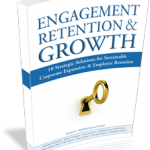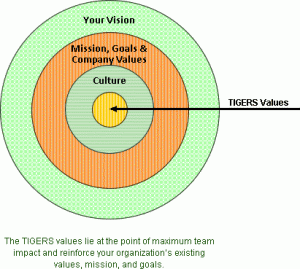 Employee infidelity. It can be the demise of today’s businesses. But just what does it mean when employees are unfaithful to an organization?
Employee infidelity. It can be the demise of today’s businesses. But just what does it mean when employees are unfaithful to an organization?
It means that a once solid relationship between employee and employer is now broken and the employee has moved on to a competitor willing to “woo” and nurture their expertise and talents. These employees abandon job positions and the companies who no longer fulfill their needs, visions, or goals. They “feel” empty and go in search of an organization that holds them in high regard, builds confidence, and challenges them to greater heights! (Make no mistake… infidelity also affects clients, customers, and vendors who no longer feel connected to the organization. Break the relationship and valued business players leave you for another). But for the purpose of this article, I am focusing on employee loyalty and faithfulness.
So just what are some of the ways to keep employees loyal to your organization?
Build Employee Fidelity by Creating, Retaining, & Sustaining REAL Relationships
According to Andrea Adams-Miller; renowned author, speaker, and radio show host, loyalty relies on three things: connection, contact, and consideration. Employees can be fickle when it comes to loyalty if there is a lack of connection between professionals, when contact wanes, and when the employee feels that the business they have invested in is not considerate of them or their needs.
When an employee reaches this level of disconnect, organizations lose them to competitors. A situation any smart business owner or CEO recognizes as a threat to the company. As one relationship dissolves, the trickle-down impact can negatively affect the progression of business and the cohesiveness of the surviving team.
As Heather Huhman, member of the Young Entrepreneur Council, so eloquently stated, “It’s important to understand that each employee has individual goals and values. Therefore, what makes one employee happy might not be the same for another. Improve engagement by understanding your employees’ preferences, seeking their input regularly and creating transparency in communication.”
Encourage Employee Fidelity by Bringing “Participation” Back to Dull, Unproductive Meetings
“No one ever participates at meetings,” is a common complaint heard throughout many organizations. The ugly truth is that meetings have deteriorated to the point of being unfocused and unproductive. They zap employee energy and productivity as well as organizational time and money.
“What goes on in the meeting room is a microcosm of the entire organization. You have a diverse group of individuals with different personalities, expectations, cultures, goals, issues, and working styles who need to work together successfully for the good of the organization,” states Ida Shessel, author and CEO of Ida Shessel International, Inc.
To run a successful, productive meeting, a few measures Ida suggests are:
- Considering a broader perspective of what participation means. For example: consider breaking into smaller groups to brain storm or the option of submitting written proposals after a meeting adjourns.
- Clarifying beforehand the type of meeting and expectations. Also send agendas before the meeting to get the juices flowing.
- Fostering creativity by changing the meeting room surroundings. Why have meetings in the same drab, windowless room week after week? However, if you can’t change your meeting location then consider redecorating and brightening walls or adding couches.
- Capitalizing on the talents and skills of the diverse group of participants in the room. Thank employees for their contributions and communicate important milestones and objectives reached.
Promote Business Fidelity with Emotional Intelligence (aka soft skills)
Emotional intelligence (EQ) is the skill set of learning how different people respond emotionally to varying management styles and personality types in any particular situation. Up to 75% of Fortune 500 companies are getting onboard with emotional intelligence training.
Unfortunately many more organizations are likely to provide managers, leaders, and employees with technical skills training rather than soft skills training. Without fostering emotional intelligence, these individuals gain job expertise, but lack the skills to effectively lead and interact with employees and teams. With poor communication and problem solving skill sets, it’s easy to see how relationships quickly break down.
For in depth “how to” solutions on creating “faithful” employees — straight from 10 top experts in their industry— go to:
 Engagement, Retention & Growth to review current best practices. One solution will not address your unique initiatives, but a combination might make more sense to your complex systems. For this reason, TIGERS Success Series presents viable solutions from diverse perspectives in change management, marketing, training, team development, executive recruitment, employee retention, and sales. Each solution is offered in a 30-minute comprehensive recording from experts in their industry. We provide the best strategies to advance growth… stay ahead of the competition … adapt quickly to change … and improve your company’s bottom line. And, you are encouraged to share these recordings with your employees.
Engagement, Retention & Growth to review current best practices. One solution will not address your unique initiatives, but a combination might make more sense to your complex systems. For this reason, TIGERS Success Series presents viable solutions from diverse perspectives in change management, marketing, training, team development, executive recruitment, employee retention, and sales. Each solution is offered in a 30-minute comprehensive recording from experts in their industry. We provide the best strategies to advance growth… stay ahead of the competition … adapt quickly to change … and improve your company’s bottom line. And, you are encouraged to share these recordings with your employees.
Copyright TIGERS Success Series by Denise McGill
About TIGERS Success Series, Inc.
TIGERS Success Series is a team development company that opened its doors in 1989. TIGERS is a proprietary group development process that helps forward-thinking and committed leaders build cooperative teams of employees who are engaged in the success of the organization.
TIGERS offers Team Development Certifications for the use of proprietary group development tools, Consulting and Organizational Development Services